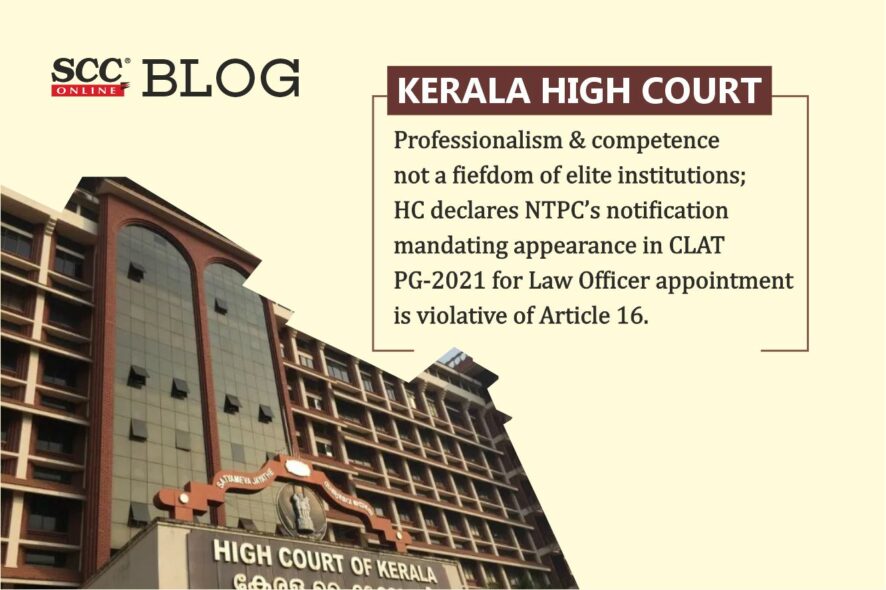Kerala High Court: In a significant relief to non-NLU law graduates seeking job opportunities in PSUs, V.G. Arun, J., declared that NTPC’s notification for the recruitment of Assistant Law Officers is discriminatory and violates Article 16 of the Constitution for confining the selection process only to CLAT PG-2021 candidates.
The Court expressed,
“There is no logical basis for the assumption that professionalism and competence is the fiefdom of only those passing from elite institutions. The process now adopted is more like a walkover to the finals for a chosen few, without competing in the preliminaries.”
Factual Backdrop and Interim Order
The petitioner, a Law Graduate, had approached the Court to challenge the notification published by National Thermal Power Corpn. Ltd. (NTPC) inviting applications for appointment to the post of Assistant Law Officer. As per the notification, the selection is confined to only those candidates who have appeared for CLAT-2021 (Common Law Admission Test-2021) Post Graduate programme conducted by the Consortium of National Law Universities. Based on their performance in the test, the candidates would be shortlisted for document verification.
The petitioner being a law graduate with the requisite minimum marks was desirous of applying for the notified vacancy, but was prevented from doing so, as she had not appeared for the CLAT-2021 PG programme. Therefore, she had assailed the selection process on the ground that it is discriminatory and violates Article 16 of the Constitution.
Finding prima facile merit in the challenge, the Court had passed an interim order, directing the NTPC to accept the petitioner’s application, subject to the final outcome of the writ petition.
Grounds for Challenge
The petitioner had assailed the notification on the following grounds:
- Imposing a precondition that the candidates should have appeared for CLAT 2021 PG programme and making selection on the basis of marks secured in CLAT 2021, militates against the fundamental right to equality of opportunity in public employment guaranteed under Article 16 of the Constitution.
- The fees in NLUs being much higher than in other Law Colleges, including the fee for participation in entrance exam, i.e., CLAT PG being much higher than the fee for admission tests for other law colleges, the notification discriminates between those having the financial capacity for pursuing their higher studies in National Law Universities and others, who opt to join law colleges with lesser fees.
- By the offensive clause, the zone of eligible applicants is reduced to a small fraction, from among the multitude of law graduates aspiring for public employment.
- The clause has no rational nexus with the objective sought to be achieved, viz; selection of the most competent from among the law graduates.
Analysis and Findings
The NTPC argued that employers enjoy a prerogative in fixing eligibility criteria and there is limited scope for judicial interference. Rejecting the aforementioned argument, the Court opined that the prerogative exists unless the act of the employer is found to be arbitrary, unreasonable or having no rational nexus to the objective sought to be achieved. The Court noted that in the case at hand the challenge was not against qualification or eligibility, but focused on the selection process. The challenge was mainly on the ground that, incorporation of the restrictive selection criteria was nothing but indirect discrimination as recognised in Nitisha v. Union of India, (2021) SCC OnLine SC 261.
Similarly, rejecting the NTPC’s argument that it is inexpedient to conduct selection test across India for filling up ten posts, the Court held that such argument was antithesis to Article 16 of the Constitution; since as long as the Constitution guarantees equality of opportunity to the citizens, the State and its instrumentalities have a corresponding duty to ensure such opportunity to all.
The Court noted that out of the 1721 law colleges in India, only 23 are members of the Consortium of National Law Universities. Another crucial aspect, making the selection process plagued by indirect discrimination is that consideration for selection is confined to candidates who had appeared for CLAT-2021 PG programme alone and even candidates who had appeared for the previous year’s CLAT PG programme and performed well are kept out of the zone of consideration.
“The process now adopted is more like a walkover to the finals for a chosen few, without competing in the preliminaries.”
Noticing that the selection is based on a test conducted much prior to the issuance of impugned notification, the Court opined that law graduates aspiring for appointment in public sector undertakings cannot be expected to appear for an admission test, hoping that in future that test will be made the criterion for selection and appointment to PSUs.
Lastly, the Court observed that the focus of the test is on academics and not an assessment of the skill set expected of future Law Officers which makes the selection process devoid of any rational nexus with the objective.
Conclusion
In the backdrop of above, the Court concluded that the impugned notification, insofar as it confines the selection process to only candidates who had participated in the CLAT-2021 PG programme, violated Article 16 of the Constitution.
However, rather than upsetting the whole selection process, the Court had directed the NTPC to accept the petitioner’s application and conduct a selection test or interview for testing her eligibility for appointment to the notified post. The Court directed that further action with respect to the appointment shall be taken depending on the outcome of such selection test/interview.
[Aishwarya Mohan v. Union of India, 2022 SCC OnLine Ker 3090, decided on 06-06-2022]
Appearance by:
For the Petitioner: Advocate Maitreyi S.Hegde
For Union of India: SGI Tushar Mehta assisted by Advocate Adarsh Tripathi, ASG S.Manu and Advocate N.S. Daya Sindhu Shree Hari
*Kamini Sharma, Editorial Assistant has reported this brief.







